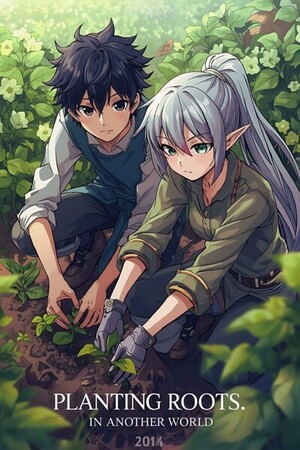Chapter 2:
His Worth
Planting Roots in Another World
Akira stood at the edge of the elven fields, his boots sinking slightly into the cracked, dry soil. The morning sun cast long shadows across rows of wilting moonwheat, their silvery stalks drooping under the weight of neglect. The air carried a faint scent of dust and fading greenery, a stark contrast to the lush forest surrounding the village. Elves moved among the crops, their faces etched with worry, their hands gently coaxing plants that seemed to beg for life. Akira’s heart ached—he knew this struggle from his studies back home, where farmers battled poor soil and unpredictable rains.
Elara approached, her silver hair shimmering like the stream that wound through the village. “What do you see, Akira?” she asked, her emerald eyes searching his face.
He knelt, sifting the parched earth through his fingers. “The soil’s exhausted. You’ve been planting moonwheat here for years, haven’t you?”
She nodded. “It’s our staple. We’ve always grown it.”
“That’s the problem,” Akira said, standing. “Growing the same crop repeatedly depletes specific nutrients. The soil can’t recover. We need to rotate crops—plant different ones each season to balance them.”
Elara tilted her head, curious. “Rotate? Like changing the dance of the seasons?”
Akira smiled at the analogy. “Exactly. For example, beans can add nitrogen to the soil, which this plant, which you all called moonwheat, needs. Plant them one season, then switch to moonwheat or glowroot the next. It keeps the soil healthy and reduces pests.”
Her eyes lit up. “That’s clever. What else can we do?”
“Composting,” Akira said, gesturing toward a pile of discarded vegetable peels and leaves near the village kitchens. “Those scraps can become rich fertilizer if we mix them properly—green materials like food waste with brown ones like dried leaves. It’s like giving the soil a meal.”
Elara frowned. “We pile our waste, but it just sits there. Is there a better way?”
“Yes. Layer them, keep them moist, and turn them occasionally. It’ll break down into something we call ‘black gold’ back home—full of nutrients,” said Akira.
“And water?” she asked. “Our rains are scarce lately.”
Akira glanced at the distant river, its gentle rush audible even from here. “We can build channels to bring water to the fields. Simple furrows, using gravity to guide the flow. It’s not magic, but it works.”
Elara’s smile was warm, but a shadow crossed her face. “The elders won’t like this. They trust our traditions—magic and prayer to the forest spirits.”
“I respect that,” Akira said, his voice earnest. “But sometimes, nature needs a little help from science.”
She nodded. “Let’s speak to them. Together.”
At the village center, beneath the canopy of a massive oak, Elder Thalion and a dozen others gathered. Their expressions ranged from curiosity to skepticism as Akira explained his plan. He stood beside Elara, clutching the ancient book that had brought him here, its leather cover warm against his palms.
“Crop rotation?” Kael, the stern archer from Akira’s arrival, scoffed. “Our ancestors grew moonwheat for centuries. Why change now?”
“Because the soil is dying,” Akira said, meeting Kael’s gaze. “I’ve seen fields like yours back home. Without change, your harvests will keep shrinking.”
Thalion raised a hand, silencing Kael. “And this… composting? You’d have us pile garbage?”
“Not garbage,” Akira said. “Resources. Your kitchen scraps, fallen leaves—they can feed the soil. I can show you how.”
“And water channels?” another elder asked. “We’ve always relied on the spirits’ rains.”
“Spirits can’t control the weather,” Elara interjected, her voice firm. “Akira’s methods could work alongside our magic. Let him try on a small plot.”
Thalion studied Akira, then nodded. “Very well. One field. Prove your worth, human.”
The next morning, Akira and Elara worked side by side in a small plot near the river. The air was thick with the scent of earth and blooming starflowers. Akira showed the elves how to layer compost—green vegetable scraps with brown leaves and twigs, sprinkled with water from a wooden bucket. Elara’s hands glowed faintly as she whispered a spell, encouraging the pile to warm and decompose faster. “Our magic can speed things up,” she said, grinning.
“That’s amazing,” Akira said, marveling at the synergy. “Science and magic together—it’s like a perfect crop rotation.”
They planted starbeans in the test plot, their tiny seeds promising nitrogen for future crops. Akira then began digging shallow furrows, guiding water from the river to irrigate the land. Sweat beaded on his brow, but Elara’s laughter as she splashed him with water lightened the labor.
As days passed, a dry spell gripped the village. The main fields withered, but Akira’s plot held hope. He suggested mulching—covering the soil with straw to trap moisture. “It’s like the forest floor,” he explained to Elara. “The leaves protect the soil.”
She nodded, her eyes bright. “You see the world like we do—as alive, connected.”
Together, they spread straw, their hands brushing occasionally, sparking warmth in Akira’s chest. He shared stories of his university greenhouse, his dreams of sustainable farms. Elara spoke of elven festivals, where they danced under starlight to honor the harvest. “Maybe you’ll dance with us one day,” she said, her voice soft.
Akira’s cheeks flushed. “I’d like that.”
Weeks later, rain returned, and the test plot flourished. Starbeans sprouted tall, their leaves vibrant. The compost-enriched soil felt soft and alive underfoot, and the irrigation channels kept it moist. At a village feast, the elves tasted the first harvest—tender beans with a sweet, earthy flavor. Even Kael nodded approvingly.
Thalion raised a cup of starflower wine. “To Akira, who brings new wisdom to our land.”
The elves cheered, and Elara squeezed Akira’s hand under the table. “You did it,” she whispered.
Akira smiled, his heart full. For the first time since arriving, he felt at home.




Please sign in to leave a comment.